Empire Magazine
March 1992
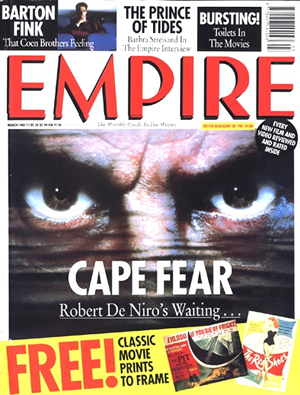
DON'T LOOK BACK ...
With a clutch of Grammys, Emmys, Tonys, Golden Globes and, yea, even Oscars already adorning her mantelpiece, Barbra Streisand is, of course, I one of the most successful entertainers on earth. Such accolades seem to be far from satisfying for this fiercely ambitious individual, however, now looking to her latest project, The Prince Of Tides, to catapult her into the first division of Hollywood filmmakers. Joey Berlin reports . . .
“MY MOTHER NEVER SAID to me, ‘You’re smart, you’re pretty, you can do what you want.’ I would say to my mother now, ‘Why didn’t you ever give me any compliments?’ She said, ‘I didn’t want you to get a swelled head.’ ”
Barbra Streisand, sitting in her L.A. home, one of seven she calls her own throughout the world, smooths her shockingly expensive-looking black cashmere outfit with her palms and looks away, somewhat embarrassed.
“Today I can look at it and go, ‘Thank you, Mom’,” she continues, “‘because if you had believed in me, I probably wouldn’t have amounted to what I am today, because I wouldn’t have had to seek your approval.’ ”
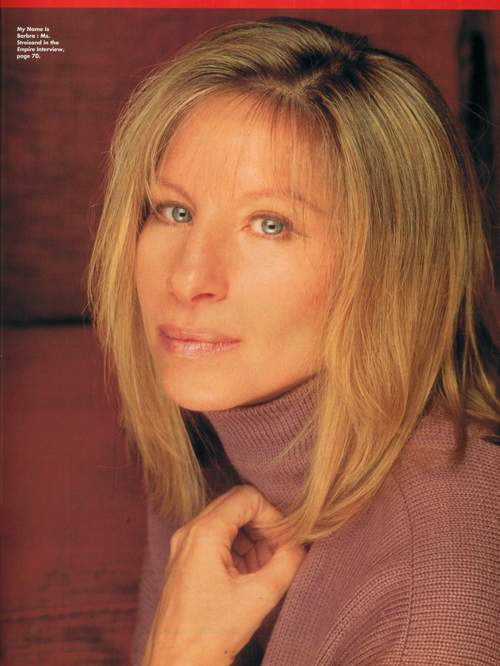
What Barbra Streisand has amounted to today is, simply, a success of quite extraordinary proportions. Born in April 1942 into a sadly impecunious New York Jewish family, the young Streisand — then plain old Barbara — apparently knew from an early age that she wanted to be an actress. Blessed with somewhat unconventional looks for a movie star in the early 60s, Streisand was obliged to make use of another talent at her disposal — a singing voice of extraordinary power and clarity. By 1963, she was selling more records than any other female singer in the world, and she has recorded, thus far, 45 albums, the combined sales of which top 250 million.
The Long Players that once came twice or thrice a year, however, now come twice a decade — if that — since by 1968, Streisand had used her Broadway success in William Wyler’s Funny Girl to clinch her first film role as Fanny Brice in the screen adaptation of the hit musical. She promptly won a Best Actress Academy Award, and proceeded to star in a mixed bag of movies, from the massively successful What’s Up Doc? and The Way We Were to the woeful financial and critical disasters of The Main Event and Up The Sandbox. Meanwhile, she continued her singing, stage and television careers, and by 1970 had become the first and only entertainer to win all the major awards — Emmys for TV, Tonys for theatre, Grammys for records and Oscars for film.
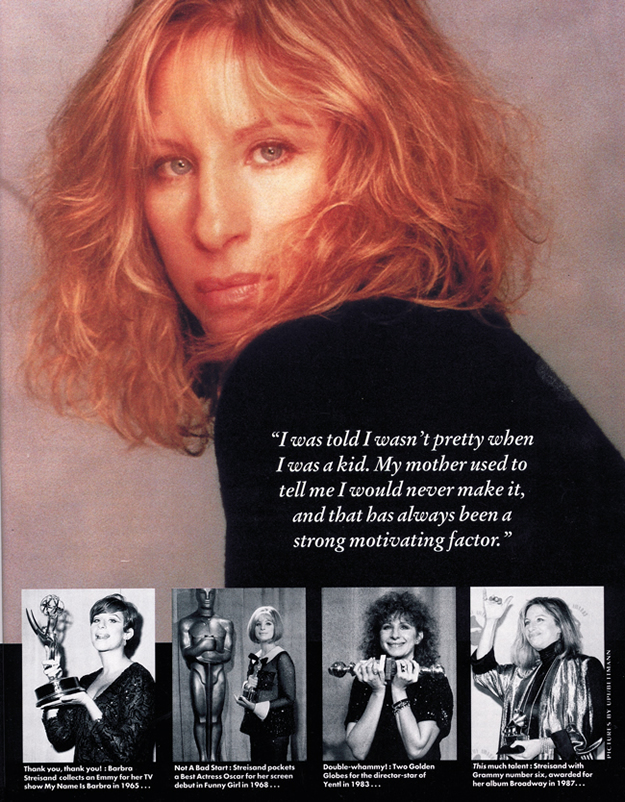
It was in 1983, however, that the full scope of Streisand’s unquenchable ambition finally came to light, when she produced, directed and starred in Yentl, the lavishly-created tale of an impoverished but educationally ambitious New York Jewish girl. A seemingly sure-fire Oscar bet, the movie proceeded to earn merely the Best Adapted Score Oscar, leading to accusations of sexism and bias in the Academy by Streisand and her supporters.
It was during this time, too, that Streisand’s strained relations with the press finally snapped, particularly after The Los Angeles Times reported — inaccurately, according to Streisand — that Steven Spielberg had assisted her with the editing of the Yentl.
“People took that and ran with it,” recalls Streisand of the affair. “They began to infer that I couldn’t have done this all by myself, that not only did I need the help of a man, but the biggest Hollywood director in the world. I said to myself, ‘I am never going to do another interview.’ ”
Except, of course, that this has now all , changed with the release of her latest one-woman effort, The Prince Of Tides, a long, loving adaptation of Pat Conroy’s best-seller in which she not only cast herself as the New York shrink who assists the damaged Nick Nolte to confront his past, but also finds space in the cast for her son by Elliot Gould, 25-year-old Jason. Although Streisand has come out of hiding in a big way to promote herself as producer-director-star of The Prince Of Tides, her recent press relations have, however, not always been plain sailing. During an American TV 60 Minutes profile of her at the end of last year, for instance, she clashed bitterly with interviewer Mike Wallace, even breaking down when informed that her mother had said Streisand simply doesn’t have the time to be close to anyone. “You like this?” she entreated Wallace. “That 40 million people have to see me like this?”
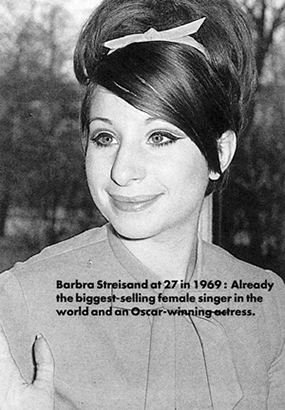
Streisand has, though, ploughed on with her promotional duties, largely it is said because, after the rebuff to Yentl, she is unswervingly determined to win a Best Director and Best Film Oscar to add to the Best Actress for Funny Girl and Best Song for A Star Is Born in 1976. She has even gone to the bizarre extent of including in her compilation album Just For The Record her acceptance speeches for her first two gongs, a move designed, according to one Hollywood executive, to show her “humble respect” for the Academy.
Whether The Prince Of Tides cleans up on March 30 or not, there is no doubting that, after the relative disappointments of Yentl and 1987’s Nuts, Barbra Streisand has at last created another hit, the movie having taken nearly $45 million in its first three weeks in the US, a record she naturally hopes to repeat throughout the world. And so it is, with The Prince Of Tides released in the UK this month, that the astonishingly fit and youthful-looking 49-year-old Barbra Streisand settles down for a re-acquaintance with the press ...
How did you approach directing The Prince Of Tides?
I do a lot of research on things. When I was doing Yentl, I did about three years’ research. I don’t know how to describe this process to you. I either feel something and feel attached to what it’s about and what I want to say or I don’t. And I don’t make many movies, so I don’t feel that attached to most subjects.
What drew you to this subject?
This one I felt passionate about because it’s about real life. We all come from families. We all want to be whole human beings. We all want to get the most out of life. I know therapy has been very helpful in my life, so when I read this story about love having the ability to transform in this setting of therapy I felt passionate about it. I’m saying that as opposed to psychiatry, because I don’t particularly believe in Freudian analysis any more. The themes that the film deals with are very important to me. Forgiveness, that’s a big one. To come to terms with your past, to accept what was and be able to change by acknowledging the problem, not living in denial, which is what we’re living in in this country now, a kind of state of denial.
In what way do you think Americans are living in a state of denial?
President Bush saying that we’re not in a recession. This country is in a bad state. This world is in a bad state. It’s like this movie. It’s like repairing ourselves, repairing the world. In the Jewish tradition there’s a phrase which means “To repair the world.” It comes from every individual, if we come from a place of love rather than hate. Because if you really feel, how can you watch the destruction of a planet and not do anything? I don’t know how we are going to be able to exist. When I was making this movie I didn’t have time to watch CNN all the time. Now that the movie’s over, I have this channel on all day, listening, and I’m just shocked by what’s going on.
What would be your message to people about what's happening?
I hope that people know that they have to vote for the Democrats and that they have to put more women in office. This is talking against myself because I am considered one of the rich, but I’m not for what the Republicans stand for, that catering to the rich. I’d rather pay more taxes and see social reform and programmes and health care and research for AIDS. I don’t understand what’s going on in this country today. Who knows how much comes from Bush’s problem with his mother? I heard that Reagan’s father was an alcoholic.
Do you think there is hope?
I definitely think there is hope. But I think we’re in a crisis time, with the environment and pollution. We’re in a fast buck mentality, the greed — it’s all about money. It’s horrible what they’re doing to the oceans and upsetting the balance of nature. It breaks my heart.
So you've started a foundation to combat these problems?
Yes, it’s called the Streisand Foundation. I started it a long time ago when I established a university chair in my father’s name. It’s called the Streisand Chair in Cardiology to study cholesterol and congenital heart diseases. Then I support a programme about the study of men and women at the University of Southern California, sexuality and intimacy, men and women in a changing society, because I want to understand how the women’s movement is affecting men and relationships in today’s society. Then with the One Voice concert, I gave those proceeds to helping the environment, anti-nuclear activities and civil liberties organisations. We had a recycling effort on this set because we should raise consciousness everywhere. I must say, it was very successful.
Have you ever been invited to the White House?
I’ve been invited many times and I’ve never accepted an invitation. When Bush came to California they wanted me to sit at his table and I refused to go. I even got a letter from Barbara Bush's secretary that asked me if I would do my One Voice concert on the front lawn of the White House for Norman Schwarzkopf. That money we raised the night I did the One Voice concert went to elect five Democrats to the Senate, so it was bizarre to ask me to sing in front of the White House.
Politics is a bizarre business.
I find it fascinating how millions of American vote not to give themselves aid. I don't understand how anyone could support the Republican Party that caters to the rich. I don't understand it.
But you re positively stinking rich. The Prince Of Tides author Pat Conroy says you live like Marie Antoinette.
And he didn t see some of my other houses. He only saw my New York apartment ...
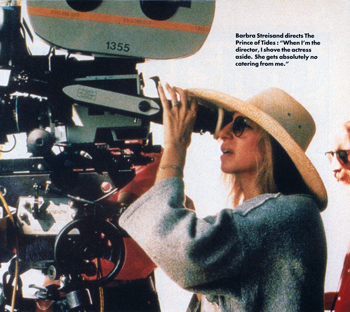
It's notoriously difficult to adapt a novel for the screen How did you decide what to leave out?
I just told the story I thought was important to tell. The dolphin story (in the book) is lovely, but it's not important to the issues I wanted to address. I loved the character of the grandmother, but that was outside of this story. The issue is, love can transform, that boys need mentors, and that they can't be their fathers. There is something screwed up in our parental relationships. It's a competitiveness between father and son, the competition between mothers and daughters, the sexuality that exist between fathers and daughters and between mothers and sons. It has to be dealt with.
And you believe it can be dealt with?
I believe people can heal the pain of their childhood. I believe we all want to forgive and it's a wonderful feeling to let go of anger. It makes you a richer person, a happier person. I don't know what else there is in life except to go after those kind of goals, to be able to be a mature adult and with some distance and consciousness go back and rediscover that you're not so awful as you were told.
You chose to cast your own son as your character's son in the movie. How did you deal with him?
I’m always his director and his mother. I become very maternal when I’m directing. I found that out on Yentl. So, it’s not just Jason, I feel this need to nurture actors because I would have liked it as an actress from my directors, which didn’t happen often.
What do you think you've learned as a director since Yentl?
There was not much of a difference. I had more fun, and I probably could be more spontaneous and more flexible.
You're not exactly known for being flexible.
That’s not true in my work. I really like artistic compromise. I like parameters, discipline in the form. I don’t like extravagant amounts of money. I went 11 per cent over budget on Yentl and less than ten per cent on The Prince Of Tides. I’d rather it go towards charity. My point is, I wish I could be more that way in life. As an artist I see reality and appreciate it. If I have a fixed vision of something and I can’t get what I want, I’ll go with something else.
Apparently you demand perfection in your own performances. ls it harder to ask for perfection from another person?
No, I can only ask. I don’t get it every time, but I can at least try. There are certain limits that everyone has. I’m looking at that and accepting it much more easily. There’s a beauty in it, like the Indians who sew a flaw into the blanket because life is never perfect. To me, perfection is imperfection. I said that when I was 15 years old and I’m still saying it. I like a bit of a mistake here and there. I’m striving for excellence rather than perfection.
Was it easier the second time around, being both in front of and behind the camera?
It was much easier this time because it wasn’t a period musical. I was dealing with wonderful heavyweight actors as well.
You worked long hours.
That’s the way it goes. That’s the way it has to be. Something happens on a set one day and you have to continue it the next day. Something needs to be changed, rewritten. It’s a very spontaneous, alive process, that’s why I like it. Even though I do all my homework and it’s all prepared, I compromise a lot. I have sets built on weekends, little models. I move my little dolls around and stage things. When I’m the director, I shove the actress aside. She gets absolutely no catering from me. I have to do it. I think it’s fun to throw away the actress, not to cater to her.
Nick Nolte has said he could see the conflict between the actress and the director when you did the love scenes.
A shy actress got in the way of the director. She screwed the director by yelling “Cut”. I know I probably should have gone on, but you could say that the director was really there and thought she got enough. I did get very shy. I thought, “My God, how could I be making love to him in the corridor here with my crew watching?” The director was sensitive to the actress, knowing she was getting slightly embarrassed, and she cut for her.
Were those the hardest scenes?
Also where I get emotional. I don’t cry easily as an actress. I have to work into it. I have to think about something in my childhood.
Is it hard doing a part that really hits home to you?
I think that the parts I choose to play do hit home to me. I had a miserable life with a stepfather who I just despised, which I used in Nuts. Even though I’ve come to forgive my mother, I could use the part that allowed her to allow me to have that stepfather. With Yentl, I used the frustration of wanting to have an equal opportunity with a man, can you imagine what it would be like if somebody told you you had to stay home and not have a career? Incidentally, when the movie is over I like staying home, cooking and shopping. To me, it’s like relaxation to go to a supermarket. It’s like playing doll house.
Can you do that? Don't you get mobbed?
Sure, but I like to do it in towns like Sun Valley, Idaho, where it’s no big deal. Nobody bothers me because I’m just a member of the town when I go there. I enjoy that. That’s my fun.
Why do you pick projects that are so bloody difficult to get to the screen?
I’m a masochist, don’t you know? I like challenges, I guess I’ve just grown up with them. It’s part of my nature. Part of me was terrified to make this movie and make Yentl. I always have to ask for a sign — “should I make this movie?” Then I get the sign and I do it.
The sign? What sort of signs do you get?
I guess it’s the equivalent of prayer, asking what to do. They wanted me to give back almost a million dollars of my fee for Yentl. I thought that was too much and I’d give back half a million dollars. If they didn’t take that I wouldn’t have done the movie. I went to bed, where I have a painting of a beautiful lady in pink. There’s a light over the painting. In the middle of the night I was awakened by a click. The light goes on over the painting. I sit up in bed and what came to me was, “Light up your art.” Totally visual and totally real. I was cynical anyway, so I turned off the light and went to bed and a few hours later the light went on again and it was like, “You didn’t believe me?” The next morning they called back and said I only had to give back half a million dollars.
Wasn't there just a short circuit?
Later on, a week later, it did short out, but it had never happened before, so why that night? Who knows? I took it as a sign. I also knew instinctively that I wanted to make the movie because I had redecorated my apartment while I was working on the script in L.A. so I could live in it. In my gut I knew I wanted to make that movie, although I was very frightened.
And did you feel instinctively that you wanted to direct The Prince Of Tides?
To direct, but I also thought I was the best person for part. Can you think of someone who could play it better? She was a New York Jew. The way she lived her life, I knew all about her. That’s why I could play her easily, likeYentl. If I played the lead in a project I've been working on for the past few years, in which my character gets Parkinson’s disease, that I would think twice about. I don’t know if I could act it and direct it. I would probably like to direct Meryl Streep in it.
How can audiences ever really overcome the fact that it's Barbra Streisand on the screen in your movies?
I can’t help that. Certain people have said, “God, I want you to be my therapist, I really believe you as a therapist.” I’ve had a lot of experience with therapists, so I know I was true to the form. Some people think my persona’s too big to believe me, but I can’t help that.
How did you decide you were going to be both a singer and an actress?
I didn’t think about it. Other people do, but I didn’t. I always wanted to be an actress. I sort of wanted to be a symphony conductor when I was 14. I used to conduct classical music in my bedroom. I only started to sing because I couldn’t get work as an actress and I was known as the kid in the neighbourhood who had a good voice, so I thought maybe I could get a job and pay the rent that way. So I started to sing, but I really wanted to be an actress. I got famous as a singer, but by then I was on Broadway.
What was the attraction to play Funny Girl?
I was told I wasn’t pretty when I was a kid. That musical was about Fanny Brice, who was obviously told she wasn’t pretty. My mother used to tell me I would never make it because I wasn’t conventional looking, and that has always been a strong motivating factor.
There’s a lot of talk about Oscar possibilities for The Prince Of Tides. ls that an awful burden?
Yeah, it’s bothersome. I don’t like to think about results, because then it’s very disappointing. If you’re popular at the time, you’re more likely to get an award.
Now that you've decided to do interviews, are you a more accessible person?
I guess I’ve never done it before, so that must mean I am. I think it’s different when I direct a film. Even though I didn’t do interviews on Yentl, to tell you the truth I don’t even remember being asked to. Sometimes I have a hard time articulating, but when something moves me I trust that. There’s a beautiful thing that Margaret Graham wrote to Agnes De Mille in this book I’m reading. It was, “Just keep your channels open, don’t judge it, just do the work. You don’t even know if it’s good or bad.” There’s always a slight discontent or dissatisfaction when you’re an artist, but that’s just the way it is . . .
END.
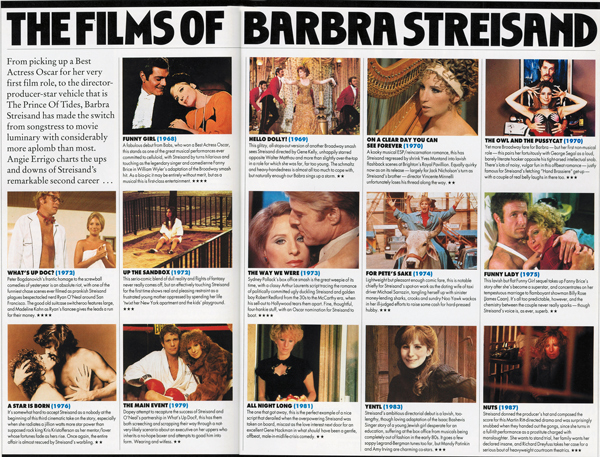
Related Link: “Prince of Tides” film pages
[ top of page ]
